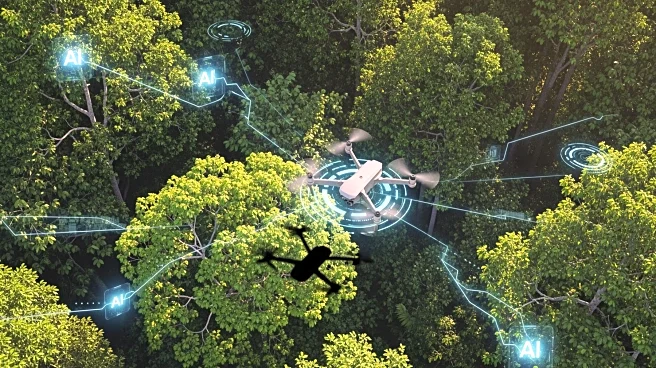What's Happening?
Re.green, a Brazilian ecological restoration company, is leveraging advanced technology to restore tropical forests in Brazil. The company uses AI algorithms to analyze data and satellite imagery, identifying
optimal areas for reforestation projects. It acquires land from farmers and ranchers, employing various restoration techniques tailored to the environment. In remote areas, drones are used for planting operations, while seedlings from native species are cultivated at Bioflora, a nursery owned by re.green. The company aims to recreate fully functioning tropical forests, similar to those existing before deforestation. Re.green monetizes its efforts through sustainable forestry and carbon credit schemes, with recent agreements to sell millions of tons of carbon removal credits to Microsoft and Nestlé. The company has planted over 6 million seedlings across 30,000 hectares and plans to expand its operations significantly by 2032.
Why It's Important?
Re.green's initiatives are crucial in combating deforestation and climate change, offering a model for sustainable ecological restoration. By utilizing technology, the company enhances the efficiency and scalability of reforestation efforts, potentially transforming the economic landscape of ecological restoration. The sale of carbon credits provides financial incentives for companies to offset emissions, promoting corporate responsibility in environmental conservation. The partnerships with major corporations like Microsoft and Nestlé highlight the growing demand for sustainable practices and carbon offset solutions. Re.green's approach not only contributes to biodiversity preservation but also supports local economies through sustainable forestry, creating a viable economic sector around ecological restoration.
What's Next?
Re.green plans to raise $60 million by the end of 2025 to further scale its AI and satellite technology. The company aims to plant 65 million seedlings by 2032, expanding its restoration projects across Brazil. The recent Earthshot Prize win is expected to boost visibility and facilitate partnerships with large corporations, accelerating research and development. As the company continues to grow, it may influence policy changes and inspire similar initiatives globally, fostering a new economic sector focused on large-scale ecological restoration. The success of re.green could lead to increased investment in sustainable practices and technology-driven environmental solutions.
Beyond the Headlines
Re.green's work raises important ethical and cultural considerations regarding land use and indigenous rights. The transformation of degraded land into productive forests must balance ecological goals with the rights and needs of local communities. The company's reliance on technology also prompts discussions about the role of AI in environmental conservation, highlighting the potential for innovation to address complex ecological challenges. As re.green scales its operations, it may face scrutiny over transparency and accountability in carbon credit schemes, necessitating robust verification processes to ensure credibility and effectiveness.










